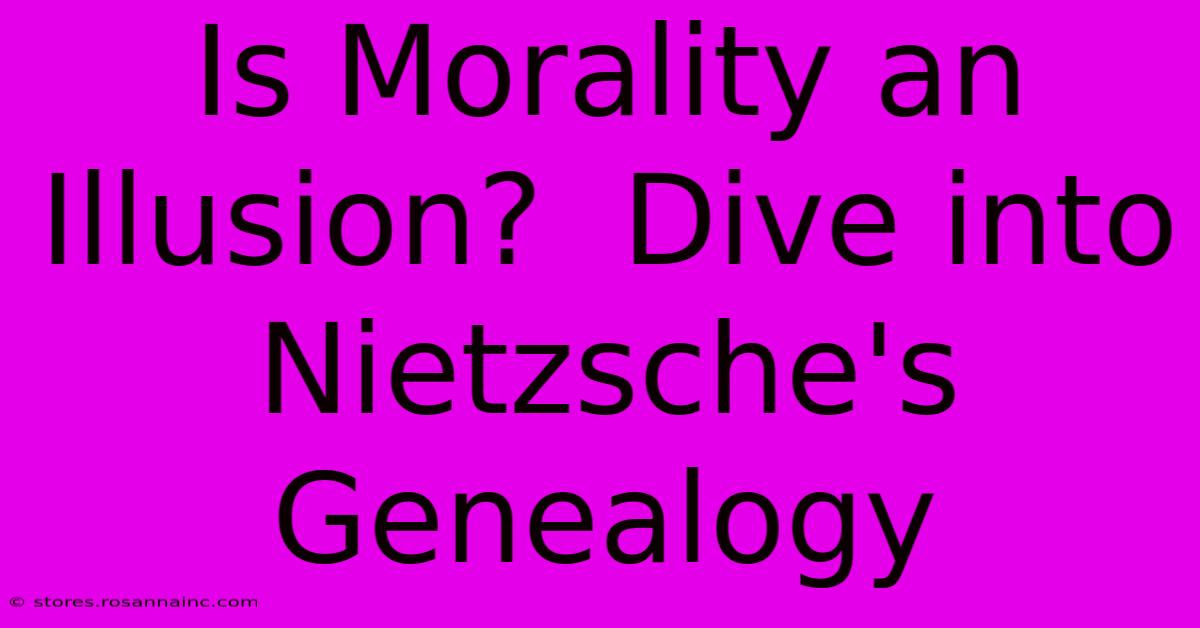Is Morality An Illusion? Dive Into Nietzsche's Genealogy

Table of Contents
Is Morality an Illusion? Diving into Nietzsche's Genealogy
Is morality a genuine guide to human action, or is it merely a cleverly constructed illusion, a tool used to control and manipulate? This profound question has haunted philosophers for centuries, and Friedrich Nietzsche's Genealogy of Morality offers a particularly compelling and controversial perspective. Nietzsche argues that morality, far from being a divinely ordained or naturally inherent system, is a human construct, a product of power dynamics and historical contingencies. This article will explore the key tenets of Nietzsche's genealogical approach, examining his critique of traditional morality and his alternative vision.
Deconstructing Traditional Morality: Master-Slave Morality
Nietzsche's genealogy dismantles what he terms "slave morality," a system he believes emerged from the resentment of the weak towards the strong. He contrasts this with "master morality," a system valued by the powerful, those who assert their will to power.
Master Morality:
-
Characteristics: This morality values strength, pride, nobility, and self-affirmation. Actions are judged based on their inherent power and effectiveness, not according to external rules or commandments. The focus is on self-overcoming and the pursuit of excellence. "Good" is what enhances life and power; "bad" is what weakens or diminishes it.
-
Origin: Nietzsche sees master morality as arising naturally from the strong and assertive individuals who shape the world according to their own values. It's not a codified system but rather a lived experience, a direct expression of vital force.
Slave Morality:
-
Characteristics: Nietzsche argues that slave morality inverts the values of master morality. Weakness, humility, compassion, and self-sacrifice are elevated, while strength, pride, and self-assertion are condemned as "evil." This system, according to Nietzsche, is born out of resentment and a desire for revenge against those who possess power. The weak, unable to directly challenge the strong, instead redefine the values to their advantage. "Good" becomes synonymous with weakness and meekness, while "evil" becomes associated with strength and dominance.
-
Origin: Nietzsche traces slave morality to the oppressed and downtrodden, who, through religious institutions and social structures, reshape the moral landscape to suit their needs. He views the Judeo-Christian tradition as a prime example of this "slave revolt in morality." The emphasis on humility, forgiveness, and turning the other cheek, while seemingly virtuous, are, in Nietzsche's analysis, expressions of resentment disguised as ethical principles.
The Will to Power: The Driving Force Behind Morality
Underlying Nietzsche's genealogy is the concept of the "will to power," a fundamental drive inherent in all living beings. This isn't simply a lust for domination, but a more encompassing drive for self-assertion, growth, and the overcoming of limitations. Morality, for Nietzsche, is a manifestation of this will to power, a strategy employed by different groups to achieve their goals.
The strong, in Nietzsche’s view, express their will to power directly, creating their own values. The weak, however, seek to impose their values on the strong, employing morality as a weapon to subdue and control. This struggle between the will to power is, according to Nietzsche, the driving force behind the creation and evolution of moral systems.
Beyond Good and Evil: Nietzsche's Critique
Nietzsche's critique of traditional morality isn't simply nihilistic. He doesn't advocate for a return to unrestrained brutality. Rather, he calls for a "revaluation of all values," a critical examination of the foundations of morality to free humanity from the constraints of outdated and potentially oppressive systems. This requires a profound self-awareness and a commitment to living authentically, according to one's own strength and will.
The Illusion of Objectivity: A Perspectival Approach
Nietzsche's genealogy challenges the notion of objective morality. He argues that moral judgments are not reflections of universal truths but rather expressions of particular perspectives and power dynamics. Morality, in this sense, becomes a tool, a means to an end, rather than an absolute guide to action.
Conclusion: Rethinking Morality in the 21st Century
Nietzsche's Genealogy of Morality remains highly relevant in the 21st century. His insights force us to confront the potentially insidious nature of power dynamics embedded within moral systems. While his views are controversial, they provoke crucial questions about the origins of our moral beliefs and the ways in which they shape our understanding of ourselves and the world. By critically examining the foundations of our morality, we can engage in a more nuanced and self-aware approach to ethical decision-making. Ultimately, Nietzsche’s work serves as a powerful reminder that morality is not a static, objective truth but rather a dynamic and ever-evolving construct, shaped by the ongoing struggle for power and the ceaseless pursuit of self-overcoming.

Thank you for visiting our website wich cover about Is Morality An Illusion? Dive Into Nietzsche's Genealogy. We hope the information provided has been useful to you. Feel free to contact us if you have any questions or need further assistance. See you next time and dont miss to bookmark.
Featured Posts
-
Central Bank Of Iraq Friend Or Foe Of The Average Iraqi
Feb 09, 2025
-
Turks Ve Caicos Adalari Gizli Cennetinizi Kesfedin
Feb 09, 2025
-
Thinking Of Visiting A Brothel Know The Laws In Vegas First
Feb 09, 2025
-
Millwall Defeat Leeds In Fa Cup
Feb 09, 2025
-
Mystery Of 856 Area Code Solved Location Revealed
Feb 09, 2025
